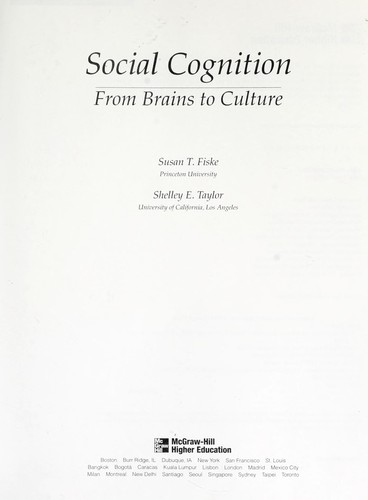Social cognition
from brains to culture
By Susan T. Fiske and Shelley E. Taylor

"Social cognition" was published by McGraw-Hill Higher Education in 2008 - Boston, it has 540 pages and the language of the book is English.
“Social cognition” Metadata:
- Title: Social cognition
- Authors: Susan T. FiskeShelley E. Taylor
- Language: English
- Number of Pages: 540
- Publisher: McGraw-Hill Higher Education
- Publish Date: 2008
- Publish Location: Boston
“Social cognition” Subjects and Themes:
- Subjects: ➤ Cognition - Cognitive neuroscience - Social perception - Sociale cognitie - Perception sociale - Conocimiento - 77.62 social perception - Interpersonal relations - Soziale Wahrnehmung - Sozialpsychologie - Kognition - Basic sciences - Biology & life sciences - Science - general & miscellaneous - Psychology - theory - History & research
Edition Specifications:
- Pagination: xii, 540 p. :
Edition Identifiers:
- The Open Library ID: OL18291201M - OL4456806W
- Online Computer Library Center (OCLC) ID: 124025222
- Library of Congress Control Number (LCCN): 2007018062
- ISBN-13: 9780073405520
- ISBN-10: 0073405523
- All ISBNs: 0073405523 - 9780073405520
AI-generated Review of “Social cognition”:
"Social cognition" Table Of Contents:
- 1- Approaches to studying the social thinker
- 2- Ebb & flow of cognition in psychology & neuroscience
- 3- What is social cognition?
- 4- People are not things
- 5- Cultures matter
- 6- Brains matter
- 7- Basic concepts in social cognition
- 8- Dual modes in social cognition
- 9- Automatic processes
- 10- Controlled processes
- 11- Motivations influence which modes operate
- 12- Models of both automatic and controlled processes
- 13- Attention and encoding : what gets into our heads
- 14- Salience : a property of stimuli in context
- 15- Vividness : an inherent property of stimuli
- 16- Accessibility : a property of categories in our heads
- 17- Direct perception : not just in our heads
- 18- Faces : the focus of social attention
- 19- Representation in memory
- 20- Associative networks organizing memory
- 21- Procedural and declarative memory : what memory does
- 22- Parallel versus serial processing : coordinating memory processes
- 23- Embodied memory
- 24- Interim summary of memory models
- 25- Social memory structures : why social memory matters
- 26- Topics in social cognition : from self to society
- 27- Self
- 28- Mental representations of the self
- 29- Self-regulation
- 30- Motivation and self-regulation
- 31- The self as a reference point
- 32- Causal attribution processes
- 33- What is attribution theory?
- 34- Early contributions to attribution theory
- 35- Processes underlying attribution
- 36- Attributional biases
- 37- Heuristics
- 38- What are heuristics?
- 39- When are heuristics used and when do they lead to wrong answers?
- 40- Judgments over time
- 41- Accuracy and efficiency in social judgment
- 42- Errors and biases as consequential : improving the inference process
- 43- Errors and biases in social inference : perhaps they don't matter?
- 44- Are rapid judgments sometimes better than thoughtfully-considered ones?
- 45- Neuroeconomics : back to the future?
- 46- Cognitive structures of attitudes
- 47- Background
- 48- Cognitive features of two consistency theories
- 49- Lay theories and attitude change
- 50- Functional dimensions of attitudes
- 51- Cognitive processing of attitudes
- 52- Heuristic-systematic model
- 53- Peripheral vs. central routes to persuasion : elaboration likelihood model
- 54- Motivation and opportunity determine attitude processes mode model
- 55- Implicit associations
- 56- Embodied attitudes
- 57- Neural correlates of attitudes
- 58- Stereotyping a central topic in social cognition
- 59- Introduction
- 60- Blatant bias
- 61- Subtle bias
- 62- Effects of bias
- 63- Prejudice : interplay of cogntive and affective biases
- 64- Intergroup cognition and emotion
- 65- Racial prejudice
- 66- Gender prejudice
- 67- Age prejudice
- 68- Sexual prejudice
- 69- From social cognition to affect
- 70- Differentiating among affects, preferences, evaluations, moods, emotions
- 71- Early theories
- 72- Physiological and neuroscience theories of emotion
- 73- Social cognitive foundations of affect
- 74- From affect to social cognition
- 75- Affective influences on cognition
- 76- Individual differences in the affect-cognition interplay
- 77- Affect versus cognition
- 78- Behavior and cognition
- 79- Goal-directed behavior
- 80- When are cognitions and behavior related?
- 81- Using behavior for impression management
- 82- Using behavior to test hypotheses about others.
Read “Social cognition”:
Read “Social cognition” by choosing from the options below.
Search for “Social cognition” downloads:
Visit our Downloads Search page to see if downloads are available.
Borrow "Social cognition" Online:
Check on the availability of online borrowing. Please note that online borrowing has copyright-based limitations and that the quality of ebooks may vary.
- Is Online Borrowing Available: Yes
- Preview Status: restricted
- Check if available: The Open Library & The Internet Archive
Find “Social cognition” in Libraries Near You:
Read or borrow “Social cognition” from your local library.
- The WorldCat Libraries Catalog: Find a copy of “Social cognition” at a library near you.
Buy “Social cognition” online:
Shop for “Social cognition” on popular online marketplaces.